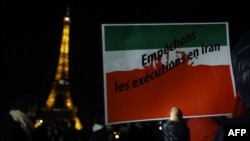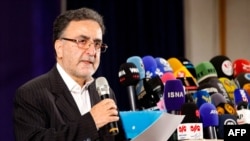
U.N. experts voiced alarm Monday at a surge in executions in Iran last month that pushed the total in the country so far this year to over 400.
At least 81 people were put to death in Iran in August alone, significantly more than the 45 reported in July, a group of 11 independent United Nations rights experts said in a statement.
The reported number of executions since the start of 2024 rose above 400, including those of 15 women, they said.
"We are deeply concerned by this sharp rise in executions," said the experts, who are appointed by the U.N. Human Rights Council but do not speak on behalf of the United Nations.
Iran executes more people per year than any other nation except China, according to rights groups including Amnesty International.
The U.N. experts, including the special rapporteurs on the rights situation in Iran and on extrajudicial, summary and arbitrary executions, said 41 of the executions last month had been of people convicted of drug offenses.
"Executions for drug offences violate international standards," they said.
The experts lamented a substantial rise in executions for drug offences in Iran since 2021, with more than 400 drug-related executions carried out last year alone.
They also said they had received reports indicating that death penalty trials in Iran often fail to meet due-process guarantees.
They pointed to the case of Reza Rasaei, a Kurdish protester, who was executed on August 6 for the murder of an Islamic Revolution Guards Corps member at an event where he had brandished a sign reading: "Women, Life, Freedom."
His conviction was based on a confession reportedly obtained through torture, and despite co-defendants retracting their testimonies implicating him in the murder and forensic evidence challenging his involvement, the experts said.
"Reports of serious violations of fair trial and due process rights mean that the death penalty as it is currently practiced in the Islamic Republic of Iran amounts to unlawful execution," they said.
The experts said they were "extremely concerned that innocent individuals may have been executed" and called for a halt to executions.







